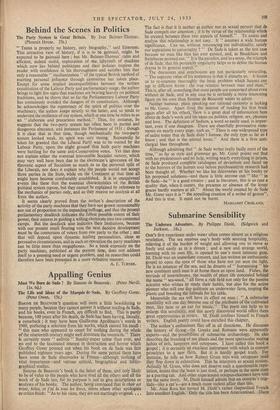Appalling Genius
The Life and Ideas of the Marquis de Sade. By Geoffrey Corer. (Peter Owen. 15s.) SIMONE DE BEAUVOIR'S question will seem a little bewildering to many people, because they cannot answer it without reading de Sade, and his books, even in French, are difficult to find. This is partly because, 140 years after his death, de Sade has been having, literally, a comeback ; it may have been Guillaume Apollinaire's words in 1909, prefacing a selection from his works, which caused his recall : " this man who appeared to count for nothing during the whole of the nineteenth century might well dominate the twentieth." There is certainly more " sadistic " Sunday-paper crime than ever, and no end to the fascinated interest in destruction and horror which Geoffrey Gorer pointed out when his book on de Sade was first published eighteen years ago. During the same period there have been some de Sade discoveries in France—although nothing of vital importance—and various critical, biographical and biblio- graphical studies.
Simone de Beauvoir's book is the latest of these, and only likely to be of value to the people who have read all the others and all the work of de Sade too, for its purpose is not to give descriptions or analyses of his books. The author, being convinced that la chair est triste, helps, et J'ai lu tous les iivres, starts where other apologists or critics finish: `As to his vices, they are not startlingly original. . .
The fact is that it is neither as author nor as sexual pervert that do Sade compels our attention ; it is by virtue of the relationship which he created between these two aspects of himself." To assess and analyse this relationship is not easy. It " assumes a wide human significance. Can we, without renouncing our individuality, satisfy our aspirations to universality ? " De Sade is taken as the test case because no man like him has ever existed, and, as Baudelaire and Swinburne pointed out, " It is the paradox, and in a sense, the triumph of de Sade, that his persisteht singularity helps us to define the human drama in its general aspect." The discussion and conclusions are not particularly rewarding. " The supreme value of his testimony is that it disturbs us. it forces us to re-examine thoroughly the basic problem which haunts our age in different forms : the true relation between man and man." This is, after all, something that most people are concerned about even without de Sade, and in any case he is certainly a more interesting figure on his own than Simone de Beauvoir wants to admit.
Neither humour, plain speaking nor rational curiosity is lacking to Mr. Corer. Apart from the interest of reading his first book again after all his others, there is a great deal of information hero about de Sade's work and his ideas on politics, religion, sex, pleasure and love. The definition of Sadism, a word so easily used, is impor- tant, even if one disagrees. Theie are cheerfully provocative state- ments on nearly every page, such as, " There is one widespread typo of sadist today that de Sade didn't foresee, the only type as far as I know • and that is the animal lover." And there is a firm anti- clerical bias throughout.
Although admitting that " de Sade writes really badly most of the time," as far as style and grammar go, Mr. Corer points out that with no predecessors and no help, writing nearly everything in prison, de Sade produced complete catalogues of deviations and faced up to the horrors of the human soul before psychoanalytic research had been thought of. Whether we like his discoveries or his books or his proposed solutions—and there is little anyone can " like " in de Sade—he " is a great creator ; and in literature, this is so rare a quality that, when it occurs, the presence or absence of the lesser graces hardly matters at all." About the world created by de Sade Mr. Corer says it is " the appalling creation of a writer of genius". And this is true. It must not be burnt.
MARGARET CROSLAND.


























 Previous page
Previous page